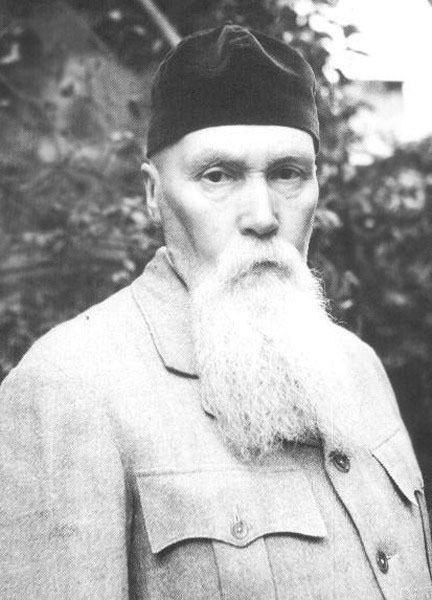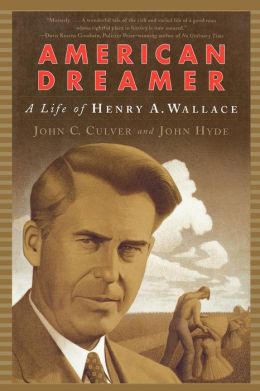I just finished American Dreamer: The Life of Henry A. Wallace by John C. Culver and John Hyde. I loved the book! I also found myself admiring Henry Walllace, who progressed from being a progressive Republican, to a progressive Democrat, to founding the Progressive Party. (Click here for a very good online short biography of Henry Agaard Wallace.)
Wallace is perhaps most commonly remembered as a member of the cabinets of President Franklin Delano Roosevelt. He served as Secretary of Agriculture in Roosevelt's first two administrations, Vice President in the third, and Secretary of Commerce in Roosevelt's fourth administration and for a year or so under Truman.
He was perhaps the most innovative and important Secretary of Agriculture in American history. (His father had also been Secretary of Agriculture.) When he took office during the Great Depression, American farmers were in great difficulty. Demand for their produce had dropped and prices had dropped even more dramatically. The had responded by producing more, thinking that they could make up for lower prices by producing more; the impact of increased supply however was to drive prices still lower. Farmers who had borrowed to survive found that mortgages were foreclosed and they were losing their farms. The 1930s were also a time of drought, poor yields, and eventually the dust bowl.
 |
| Wallace did part his hair on the left. |
When he became Secretary of Commerce, the nations industry was in full war production. There was full employment, but few consumer goods available since production was supplying the U.S. military and the military needs of the allies. Private savings were high and growing. Economic stability was assured for the moment by price controls and government allocation of goods in the economy. But it was clear that the war would soon be over and the nation would have to deal with a difficult transition to peacetime production, with a real risk of returning to a state of underemployment.
Under Wallace, the nation for the first time passed legislation to provide full employment. He created the Council of Economic Advisers and an Office of Science and Technology for the Commerce Department and promoted the government's role in research and development and technology transfer for industry. He started a reform of the patent system. He also helped to move the Department's focus from excessive focus on big business to a recognition of the critical role of small business in job creation.
As Secretary of Agriculture, Wallace oversaw a huge governmental bureaucracy, and as Secretary of Commerce he oversaw the work of a broad spectrum of responsibilities from standards, to economic statistics, to intellectual property rights, to the administration of international trade. Yet, as Vice President he had few constitutionally specified responsibilities.
However, Wallace took office as Vice President in 1941 as the United States was preparing for war and beginning to support the war effort of the Allies. President Roosevelt, however, broke precedent and assigned him major executive responsibilities -- notably direction of the War Production Board. His travels in Latin America were very valuable in promoting the Roosevelt Good Neighbor policy and bringing Latin American countries to support the Allies during the war. The fact that he had studied Spanish (among several languages) and was able to chat with people and deliver speeches in that language helped with his diplomacy.
The book illuminates the leadership style of FDR, and the proliferation of agencies under his administrations. It suggests the bureaucratic infighting among his cabinet members, and the infighting between conservatives and liberals even within government agencies. It shows the swing towards conservatism when FDR died and President Truman took office; Truman quickly replace the members of FDR's cabinet with his own appointees until only Wallace was left, and then fired Wallace.
Authors Culver (a former Representative and former Senator) and Hyde (a professional journalist) provide detailed information on Henry Wallace's three election campaigns. He won the Democratic nomination for Vice President in 1940 against strong competition due to the support of FDR and the machinations of FDR's political operatives. He lost the Democratic nomination for Vice President in 1944 to Harry Truman due to the choice of FDR to support Truman and to the machinations of FDR's political operatives. He was buried in the presidential election of 1948 as the nominee of the Progressive Party, an unsuccessful third party movement.
 |
| Nicholas Roerich |
Wallace was an intermediary between FDR and the Manhattan Project which developed the atom bomb; he was one of the first to recognize the problems that nuclear weapons were to create in the post war period. He was the first to promote real concern for the poverty, hunger and despair that were rampant in Europe after World War II, and is credited in the book with efforts that resulted in the Marshall Plan (as Truman became more liberal in the 1948 election campaign in response to the progressive challenge and to win over Dewey). While he was a supporter of American war efforts when the United States was at war, he was also very active in the promotion of peace.
Wallace opposed the Kennan-Truman policy of containment of the USSR with a ring of military installations. He believed that peace could have been negotiated with Stalin's Russia, especially in the aftermath of World War II (where Russia had taken huge casualties and lost most of its productive capacity). The peace agenda was central to the Progressive Party and to Wallace's presidential campaign. It also put Wallace into the sights of the HUAC, the House Un-American Activities Committee, Richard Nixon, and Joseph McCarthy as well as the conservative media. He dealt with false charges of being a Communist dupe for a decade.
 |
| Source |
He was the leader in the promotion of hybrid corn and the principle founder of Pioneer High Bred which played the key role in the development and dissemination of hybrid seed; the firm eventually made him and his family very wealthy although his life style was always modest. Later in life he pioneered the development of improved breeds of chickens, and the High Line chickens from his efforts eventually dominated U.S. and global egg production.
The improved varieties have helped to feed the world's burgeoning population for decades. He convinced the Rockefeller Foundation to create and support CIMMyT, the International Center for the Improvement of Corn and Wheat, and thereby played a key role in the Green Revolution.
Henry Wallace was a scientist and a statesman, a politician and a philosopher who was devoted and dedicated to peace -- but above all he was a good man.While the book is clearly a biography, and indeed a political biography, it sheds light on the changes that took place in the U.S. economy and society as well as in government during Wallace's life (1888 to 1965). I found it hard to put down. While it is longer than most of the books I read, I read it in half the time I usually take with a book. I suspect it benefits from the author's deep understanding of politics (especially Iowa politics) and their journalistic capacities. I recommend it highly!
Hubert Humphrey

No comments:
Post a Comment